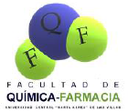Executive Secretary

VII Simposio Internacional de Ciencias Farmacéuticas 2019
VII SICF
Resumen
Viruses are the etiological agents of numerous diseases of importance to human and animal health. There is a need to seek for less toxic antiviral drugs, with more than one mechanism of action that prevents the emergence of resistance, as well as being accessible to the population in need. The Cuban flora has a wide biodiversity and species richness, whose biological activities are not completely characterized. Among them stands out the genus Phyllanthus, which has been used in the Traditional Medicine of several countries for the treatment of various conditions. There are more than 60 species of Phyllanthus that grow in Cuba, of which 77% are endemic. The aim of this work is to show the potential of Cuban endemic Phyllanthus species to obtain antivirals. The main methods developed include phytochemical screening, antiviral assays in cell cultures against different viruses and chemical characterization through LC-MS. The results obtained include the presence of antiviral activity, against several viruses, such as herpesviruses, hepatitis B virus and enteroviruses. The evaluation of the antiviral action of different fractions obtained from P. orbicularis, as well as the evaluation of the activity of some of the compounds present in these showed that the presence of certain phenolic compounds make possible their antiviral action. The results of this work are the first to show the antiviral activity of the species studied and envisage their potential as sources for obtaining antiviral products.
Abstract
Viruses are the etiological agents of numerous diseases of importance to human and animal health. There is a need to seek for less toxic antiviral drugs, with more than one mechanism of action that prevents the emergence of resistance, as well as being accessible to the population in need. The Cuban flora has a wide biodiversity and species richness, whose biological activities are not completely characterized. Among them stands out the genus Phyllanthus, which has been used in the Traditional Medicine of several countries for the treatment of various conditions. There are more than 60 species of Phyllanthus that grow in Cuba, of which 77% are endemic. The aim of this work is to show the potential of Cuban endemic Phyllanthus species to obtain antivirals. The main methods developed include phytochemical screening, antiviral assays in cell cultures against different viruses and chemical characterization through LC-MS. The results obtained include the presence of antiviral activity, against several viruses, such as herpesviruses, hepatitis B virus and enteroviruses. The evaluation of the antiviral action of different fractions obtained from P. orbicularis, as well as the evaluation of the activity of some of the compounds present in these showed that the presence of certain phenolic compounds make possible their antiviral action. The results of this work are the first to show the antiviral activity of the species studied and envisage their potential as sources for obtaining antiviral products.
Sobre el ponente

Dr. Annele Roque Quintero






